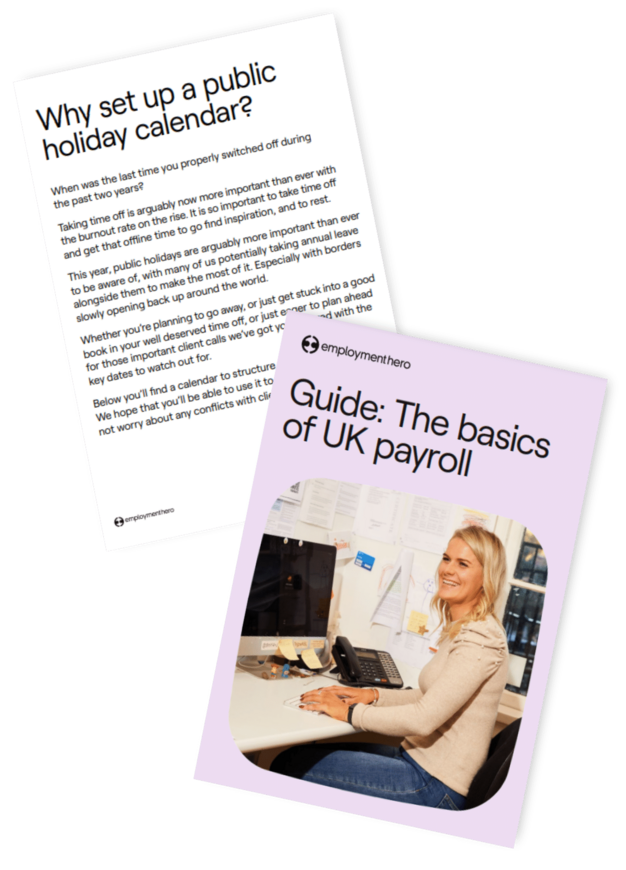
Payroll is the process of managing how employees are paid and how their work is tracked, including the number of hours worked or leave taken. The United Kingdom has a robust and complex payroll and tax system, and as an employer, it pays to understand the UK payroll process basics.
Whether you are an emerging employer or you run a small to medium-sized business, this guide aims to explain the important UK payroll basics in a simple, easy-to-understand way.
In the Employers’ version of this guide, we’ll cover:
- Which legislation covers payroll in the United Kingdom
- PAYE, tax codes and National Insurance
- How to set up and manage payroll
- Record keeping in payroll
- How payroll software can simplify the process
In the Outsourced Payroll Providers’ version of this guide, we’ll cover:
This UK payroll guide covers all the basics of payroll, including;
- Challenges of compliance
- HMRC filing, including National Insurance Contributions
- Pensions and annual holiday entitlements
- Record keeping in payroll
- The benefits of payroll software in the UK
Disclaimer
The information in this article is current as at 17 August 2022, and has been prepared by Employment Hero Pty Ltd (ABN 11 160 047 709) and its related bodies corporate (Employment Hero). The views expressed in this article are general information only, are provided in good faith to assist employers and their employees, and should not be relied on as professional advice. The Information is based on data supplied by third parties. While such data is believed to be accurate, it has not been independently verified and no warranties are given that it is complete, accurate, up to date or fit for the purpose for which it is required. Employment Hero does not accept responsibility for any inaccuracy in such data and is not liable for any loss or damages arising either directly or indirectly as a result of reliance on, use of or inability to use any information provided in this article. You should undertake your own research and seek professional advice before making any decisions or relying on the information in this article.

Why is it important for business owners to understand payroll?
As an employer operating Pay As You Earn (PAYE) as part of your payroll, you need to complete certain tasks during each tax month. But it’s a complex topic with a lot of legislation, from the Employment Rights Act 1996 to the National Minimum Wage Act 1998, and more. The payroll process can certainly be a complicated process even for large companies with dedicated payroll teams.
For small businesses, and business owners wearing different hats, juggling lots of plates, it becomes even more vital to understand payroll.
Compliance
As an employer, you’re legally responsible for completing all payroll and PAYE tasks, even if you pay someone else to do them. There are certain records you absolutely must keep, so you need to stay on top of payroll to avoid penalties, investigations and even prosecution.
Accuracy
Whether or not you register for PAYE, all companies are legally required to keep payroll records. PAYE is the UK’s system to collect Income Tax and National Insurance. As an employer, you usually need to run PAYE as part of your payroll.
The amount of Income Tax (PAYE) you deduct from your employees depends on their tax code and how much of their taxable income is above their Personal Allowance. You need to get this right so that you and your employee are paying the correct amount of tax.
Likewise, it’s the employer’s responsibility to calculate the amount of National Insurance due – and again, you want to make sure you’re getting it right.
There are also many different types of pay – Statutory Sick Pay, Statutory Pay for parents (maternity, paternity, adoption, bereavement or shared parental pay), and even tips. There are also expenses and benefits to calculate, and as an employer there are certain payments that you can reclaim from HMRC.
You’ll need to send reports to HMRC to claim any reduction on what you owe – so it’s important to keep accurate records and make accurate calculations, because all of this has a huge bearing on your business, not to mention your employees.
Staff satisfaction, wellbeing and morale
Speaking of employees, payroll directly affects them. Your employees are your business, so if you aren’t on top of payroll, this will start to impact members of your team. Quite quickly, you might find yourself dealing with unhappy, unmotivated employees, which impacts productivity, profitability, staff turnover, and recruitment and retention.
In a nutshell, you need to understand payroll so that you can look after your employees – make sure you pay them on time, and the correct amount.

How is income tax paid?
Every company which has directors and employees must operate PAYE. This is the system used to collect income tax and National Insurance contributions (NICs) for remuneration payable to employees and directors. Companies are under an obligation to correctly operate PAYE and to make monthly returns to HMRC of the PAYE deducted from employees.
The amount of Income Tax (PAYE) you deduct from your employees depends on their tax code and how much of their taxable income is above their Personal Allowance. Check the UK government website for up to date information on personal allowances. On top of income tax, you might also collect student loan repayments.
The amount of National Insurance owed depends on an employee’s employment status and how much they earn. National Insurance is paid with tax, which the employer takes from the employees wages before they get paid. Payslips must show these contributions. Check the UK government website for up to date information on national insurance contributions.
If you’re a director of a limited company, you may also be your own employee and pay Class 1 National Insurance through your PAYE payroll.
Who is responsible for taxes in the UK?
HMRC is the UK tax authority, which means that they are responsible for collecting and managing most UK taxes. They also collect most student loan repayments, which are not a tax but are more conveniently collected as a deduction from income.
HMRC also collects Scottish income tax on behalf of the Scottish and Welsh governments, although Revenue Scotland collects and manages devolved taxes in Scotland and the Welsh Revenue Authority collects and manages devolved taxes in Wales.
UK residents are liable to pay taxes on income earned from within the UK or abroad. A person qualifies as a UK resident for tax purposes if they spend 183 days (or more) per tax year in the UK, or if their home is in the UK and they have owned, rented, or lived in it for a total of 91 days, including at least 30 days in the tax year under consideration.
Most people pay Income Tax through PAYE, and how much tax is owed is determined by their tax code. Employers are legally responsible for completing all payroll and PAYE tasks, as well as student loan repayments and pension contributions, even if they pay someone else to do them.
If you’re self-employed, have a high income, or earn money from self-employment in addition to employment, or from other untaxed income such as tips or from property, income tax and national insurance is dealt with through Self Assessment.
Common payroll mistakes businesses make
Miscalculating pay
When it comes to getting employee’s pay wrong, common miscalculations include:
- Overpaying or underpaying
- Using the incorrect tax code
- Missing the first paycheck for new hires
- Deducting the wrong amount for benefits or other payroll or tax deductions
- Improperly paying employees who are on leave
Miscalculating pay is frustrating for both the employee and the employer. It can be time consuming to investigate and correct outside of the normal pay cycle.
According to an American Productivity & Quality Center (APQC) study, organisations take between two and ten days to resolve a payroll error. That’s why it’s very important to correctly calculate pay.
Quinn tip: Automate payroll with payroll software to minimise errors and mistakes
Not tracking employee hours and overtime
Incorrectly logged overtime can lead to errors with overtime payments, which can be frustrating to correct – especially if employees have been overpaid and have to return wages to their employer.
Calculating overtime is complicated – it’s not as simple as just applying a multiplying factor. Whether employees have worked during breaks, claimed travel time or are working outside of normal hours, it can be tricky to track and compensate.
Using an online timesheet system that can integrate with other business management software allows for the automation of tasks that are otherwise performed manually, which can go a long way to reduce errors.
Employment Hero’s time and attendance software will send an alert when a staff member is approaching overtime or when a timesheet requires approval, keeping everyone on track.
Incomplete or incorrect reporting
Employee payroll duties go beyond calculating salary, overtime, and taxes. As well as reporting the more traditional forms of employee pay, you also need to report other forms of taxable compensation to HMRC, such as:
- Stock options and other equity awards
- Employee benefits and rewards such as medical insurance
- Use of a company car
- Living accommodation
- Employee loans
You might not see these as compensation, but HMRC may view any of these as part of your payroll. Employees are obliged to pay tax on certain company benefits like cars, accommodation and loans, which will be taken through their wages through PAYE. The amount due depends on what kind of benefits the employee receives, and their value, which is the employer’s responsibility to calculate.
Not reporting these other forms of compensation can result in tax filing penalties for your organisation and the affected employees. Another reason why you need to get your payroll reports and records in order.
How can payroll software help?
Most businesses, especially small businesses, would never intentionally make a payroll mistake, but administrative errors can and do happen.
That’s why we recommend that employers stay up-to-date with payroll, tax and employment laws, and check in with their staff regularly – it’s always an option to seek help with payroll if needed.
Implementing payroll software can also help.

Make payroll easier with Employment Hero
Implementing an HRIS tool like Employment Hero is one of the easiest ways to improve business performance. Instead of wasting time on HR admin and letting bigger, more important things fall by the wayside, an HRIS can automate traditionally time-consuming tasks like leave management, onboarding, timesheets, managing employee files and more.
Automate as much of your payroll processes as you like by harnessing the power of a fully integrated HR and payroll automation software. We can help you reduce double data handling and the errors that come with it and never lose a timesheet or leave request again.
It’s payroll. Just faster.
RTI compliant HMRC recognised software
When you use software like Employment Hero, we help you have peace of mind knowing that your money is going to the right place. This helps remove frustrations and improve compliance with real time information (RTI) reporting – as you submit all required information with just a few clicks.
Our payroll software is tested and recognised by HMRC via our partners KeyPay, so you know when you’re using it you’re accurately paying tax and providing Real Time Information.
Save time using dynamic rosters
Employment Hero happens to allow you to have everything from approved timesheets which automatically feed through to payroll, to rostering – including snazzy templates, dynamic rostering and budgeting tools all under one roof.
Employment Hero Payroll generates dynamic and accurate rosters quickly and easily. Employees can also self-manage shift swaps and timesheets in real time so you’re never short-staffed.
Self service gives greater efficiency
When you use an in-house system like Employment Hero, your team can enter their own payroll details to the self-service platform. They can make changes easily at any time, and easily view and manage their personal details so you no longer have to keep chasing people if someone needs something changed on the system. You can also easily clock in and out for a shift.
Employment Hero Payroll will help you reduce double data handling and the errors that came with it. This means that you will never lose track of a timesheet or annual leave request again, saving you both time and money.
Comprehensive and flexible reporting
We offer a collection of flexible and comprehensive payroll reports that you can view in platform or export to Excel to easily manipulate and analyse. You can also automate reports to you and others in your business so the right information is delivered effortlessly.
When using a payroll platform, you can set up custom rule sets and automate your pay runs. All the usual manual steps required to process and finalise a pay run such as creating it, importing timesheets and applying leave requests as well as publishing payslips can be done with a click of a button.
Features at a glance
- Automatic leave balances
- Leave accrual and requests update in seconds.
- Seamless reporting
- Compliant payroll
To learn more, book a demo with one of our specialists today.
For more on Payroll, refer to our Guide on the Basics of Payroll in the UK.
Download your copy now.

